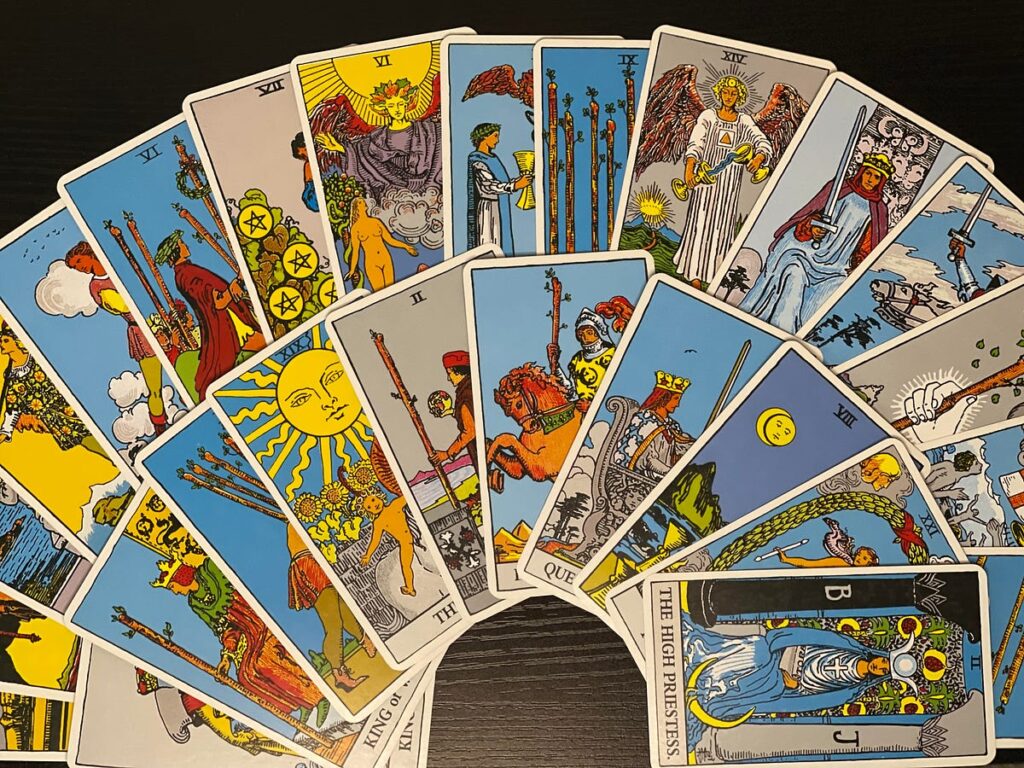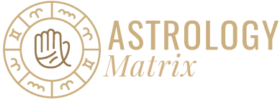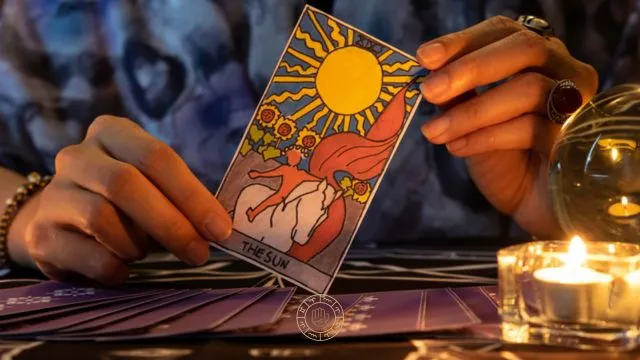
The question often arises: How can tarot assist with depression? Tarot card reading is a practice that involves using a deck of 78 tarot cards to gain insights, guidance, and a deeper understanding of various life aspects. The tarot deck consists of two main categories: the Major Arcana and the Minor Arcana.
Tarot’s Support for Depression
The Major Arcana includes 22 cards representing significant life events, various energies, and spiritual lessons. Each Major Arcana card holds profound symbolism and offers insights into a person’s journey and personal development.
The Minor Arcana comprises 56 cards divided into four suits: Cups, Swords, Wands, and Pentacles. These cards can shed light on everyday situations, emotional states, life challenges, and upcoming opportunities. The Minor Arcana cards provide more specific details and offer guidance related to day-to-day life experiences.
Can Tarot Assist with Depression? While it’s essential to acknowledge that Tarot readings are not a substitute for professional mental health care or therapy, they can offer support.
Depression is a serious mental condition that requires the attention of qualified healthcare professionals.
However, Tarot readings can provide emotional support and self-reflection, which may be beneficial for individuals dealing with depression. Tarot cards and their symbolism can help individuals explore their emotions, gain insights into their thought patterns, and identify potential areas of personal growth.
A Tarot reading can create a space for self-reflection and introspective questions that encourage individuals to examine their feelings and thoughts more deeply. Interpreting the cards with a compassionate Tarot reader can provide empathy and an opportunity for individuals to express and process their emotions.
Tarot cards offer insights into the root causes of emotional issues, helping individuals understand and process their feelings.
The imagery and symbolism in Tarot cards can assist clients in removing obstacles and expanding areas of personal growth in their lives. One of the benefits of Tarot readings for mental clarity is the creation of a safe space for exploration and self-discovery. Tarot readers are trained to approach clients with empathy, compassion, and an open mind, creating an environment where individuals feel comfortable sharing their deepest fears and concerns.
Tarot readings empower individuals to gain a sense of control and direction in their lives. Tarot’s Support for Depression, The guidance provided by the cards fosters clarity and purpose, particularly during challenging times. By comprehending the deeper meanings and underlying messages of the cards, individuals can experience a sense of empowerment and regain control over their thoughts, contributing to improved mental well-being.
Tarot serves as a powerful complement to mental health treatments, emphasizing an individual’s thoughts and helping those struggling with mental health issues gain a deeper understanding of their mental well-being, enabling them to develop more effective coping strategies.
What to Do When a Tarot Card Indicates Depression?
If a Tarot card suggests depression, it’s crucial to approach the reading with compassion and self-care. Here are some steps you can take:
- Acknowledge Your Feelings: Honor your emotions, even if they are challenging. Allow yourself to feel and express your feelings in a healthy manner, as you would with a trusted friend or a healthcare professional. Engaging in a creative outlet can be helpful.
- Prioritize Self-Care: Engage in activities that promote physical and emotional well-being, such as exercise, healthy eating, yoga, meditation, or spending time in nature. Ensure you get sufficient rest and carve out time for self-care.
- Reflect on the Reading: Ponder the cards’ messages and how they relate to your current situation. Reflect on the themes that emerge and their potential connection to your depression. Use the insights from the reading as a starting point for personal growth.
- Take Action: If the Tarot reading indicates areas of your life that need attention, take action to make positive changes. Set boundaries, seek assistance for specific issues, or make lifestyle changes to promote better mental health.
In summary, while Tarot can offer support and insights, it should be viewed as a complementary tool to professional mental health care when addressing depression. Personal growth and healing can be facilitated through self-reflection and self-care.
Tarot’s Support for Depression Tarot readings can be immensely beneficial for individuals who are grappling with depression.
Here, we will explore some of the advantages of using tarot card readings to dispel the darkness of depression.
- Gain Clarity and Insights: Tarot cards provide a window into the root causes of the emotional weight of depression. Through the symbolism within the cards, a tarot reader can help uncover patterns, identify blockages, and highlight areas for personal growth. This process can lead to a deeper self-understanding, as it delves into the issues contributing to depression.
- Enhance Self-Awareness and Resilience: Tarot readings assist individuals in becoming more self-aware of their thoughts, emotions, and behaviors. This heightened self-awareness can help identify triggers that exacerbate depression, enabling the development of effective coping strategies.
- Develop Coping Strategies: Tarot offers guidance and inspiration for developing strategies to cope with depression. The messages within the cards can guide individuals in managing their emotional well-being and finding ways to navigate their inner struggles.
- Access Inner Wisdom: The tarot can help individuals tap into their intuition and access their inner wisdom. This serves as a valuable tool for self-healing and personal growth. People can draw upon their own knowledge and intuition to seek solutions to their challenges.
- Promote Personal Growth: Tarot readings aid individuals in identifying areas for personal growth and development. By exploring the card messages, individuals gain insights into their strengths and weaknesses, enabling them to develop new skills and behaviors that promote emotional and mental well-being.
While tarot cannot directly eliminate depression, it can potentially provide emotional support, guidance, and opportunities for self-reflection.
Here are several ways in which tarot readings may be of assistance:
- Self-Reflection: Tarot encourages individuals to confront their emotions, experiences, and thought patterns. This form of self-reflection fosters a deeper understanding of oneself and helps identify the triggers associated with depression.
- Compassionate Support: Sharing one’s feelings and experiences with a compassionate tarot reader can offer validation and empathy. This can be especially beneficial for individuals struggling with feelings of isolation or a lack of support.
It is crucial to remember that while tarot can offer a degree of emotional support to those dealing with acute melancholy leading to depression, it should not be the sole solution. Tarot is not a substitute for professional mental health support. If you or someone you know is experiencing depression, it is essential to seek help from qualified mental health professionals who can provide a tailored diagnosis, treatment, and support based on individual needs.
Is Tarot Effective for Addressing Depression? Tarot readings are not scientifically proven methods for alleviating depression. While some individuals may find emotional support and a sense of empowerment through tarot, it is important to recognize that depression is a complex condition that typically requires professional treatment.
Depression necessitates a multifaceted approach, including counseling, medication, lifestyle adjustments, and professional support. These evidence-based treatments aim to identify the underlying causes of depression and offer effective solutions.
While tarot can offer emotional support, it should not be relied upon as the sole treatment for depression. It is imperative to consult with a qualified mental health expert specializing in mental health to receive appropriate guidance and treatment.
In Conclusion
If you or someone close to you is battling depression, it is strongly recommended to seek help from a psychiatrist or psychologist who specializes in mental health. Openly discuss your concerns and seek proper guidance. These professionals can provide comprehensive assessments and guide you through evidence-based treatments proven effective for managing depression. However, if you are looking for additional support and guidance in a less complex situation, a tarot card expert can be consulted to explore how Tarot’s Support for Depression.

